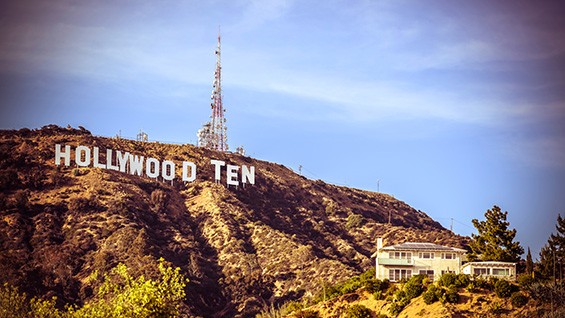
John Huston directed and Sterling Hayden starred in The Asphalt Jungle in 1950. At the time both were members of The Committee for the First Amendment, a group formed in September 1947 to support the Hollywood Ten and to oppose those who wished to blacklist actors, writers etc. who were suspected of having Communist sympathies. Already Charles Chaplin, Orson Welles and Paul Robeson had been forced to leave the US or to go underground to find work. There were two very distinct camps in Hollywood on this issue. Below is a list of the First Amendment group’s better known members:

The First Amendment Group led by Bogart & Bacall
Lauren Bacall, Lucille Ball, Humphrey Bogart, Dorothy Dandridge, Bette Davis, Melvyn Douglas, Henry Fonda, John Garfield, Judy Garland, Ira Gershwin, June Havoc, Sterling Hayden, Paul Henreid, Katharine Hepburn, Lena Horne, Marsha Hunt, John Huston, Danny Kaye, Gene Kelly, Evelyn Keyes, Burt Lancaster, Groucho Marx, Burgess Meredith, Vincente Minnelli, Edward G. Robinson, Robert Ryan, Frank Sinatra, Billy Wilder and Jane Wyatt. Noticeably not on the list are: Ward Bond, Walt Disney, Elia Kazan, Ronald Reagan, James Stewart and John Wayne. These were known supporters of McCarthyism. Of course, there were many more, just as there were many who did not support either side, people like Cary Grant, who simply sat by, said nothing, and continued to lead successful, trouble-free careers.
Sterling Hayden in The Asphalt Jungle
And then there were the turncoats, the ones that switched sides when things got a bit hot. Among this group were the naïve ones who became convinced they had been conned by the Communists. Bogart and Bacall, for example, were incensed when they learned that Hayden was a bona fide Communist. They both withdrew from the group in protest. Ira Gershwin did likewise, openly stating he was ‘appalled’ he had once been a member. Garfield and Robinson later said they too were ‘duped’ into joining the group. Ironically, both would be blacklisted anyway. Garfield refused to name names and died young in 1952. Edward G could not get work until C B DeMille, a known commie-hater, hired him for The Ten Commandments in 1956. Unlike Garfield, Hayden did name names and regretted doing so for the rest of his life. Melvyn Douglas and Fonda were ‘gray-listed’ for a time, but later resumed their careers. ‘Gray-listing’ meant you could still get work, but only in ‘B’ grade or Poverty Row productions. The ‘biggies’ did not want to know you.

John Garfield
The ‘red-hunting’ trouble began in October 1947 when the House Committee on Un-American Activities (HUAC) acted on a list of Communist ‘sympathizers’ written up in the Hollywood Reporter. The committee subpoenaed several movie industry individuals to testify at hearings to investigate the level of communist influence in the film business. Walt Disney was quick to name and remove ‘probable’ Communists in his employ. Ronnie Reagan said he thought there were many Communists in the movie unions but was unable to name any. His wife, Jane Wyman, said later that his private accusations against friends and colleagues in the industry directly led to their divorce.
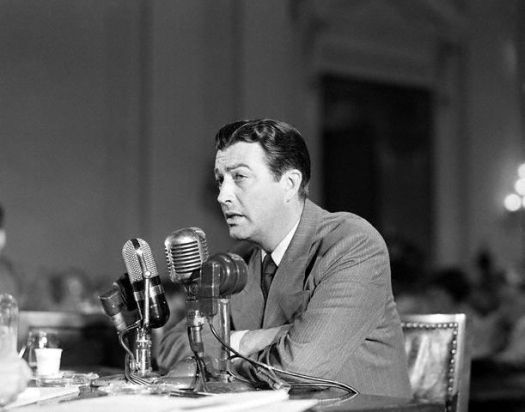
Robert Taylor testifying before the committee
Robert Taylor’s testimony was made public despite the committee’s promise to him that it would be kept private and confidential. His statement that MGM and the government made him complete Song of Russia in 1944 before he would be permitted to take up his commission in the Navy, caused a rift between the actor and L B Mayer. Taylor was livid at being ‘crossed up’ by the committee, so much so that he declared himself an ‘unfriendly’ witness, not to the cause, he said, but to the committee. He was subpoenaed. A refusal to attend would almost certainly have meant imprisonment for Taylor for ‘Contempt of Congress’. He attended as a ‘friendly witness’ and his entire 25 minute appearance was recorded. When pressed to name names of people he thought might be Communists, he replied with the following: ‘One chap we have currently, I think, is Mr. Howard Da Silva. He always seems to have something to say at the wrong time.’ Da Silva was, in fact, a Communist, although Taylor was unaware of this at the time. Reagan later recalled Da Silva menacing John Garfield for not toeing the party line at a meeting. Taylor also named self-confessed Communists Karen Morley and Lester Cole. Although Taylor did not directly call anyone a Communist, by merely pointing an accusatory finger at them he did enough to get them blacklisted.
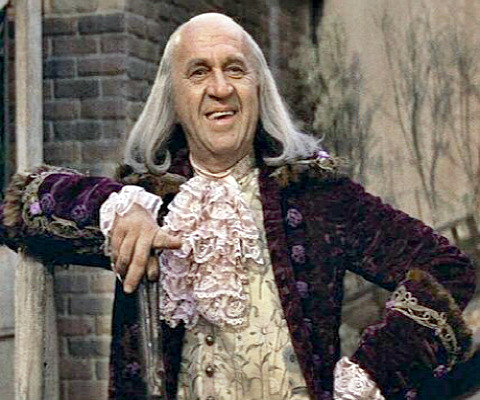
Howard da Silva in 1776
Adolphe Menjou declared himself a witch-hunter. ‘If the witches are Communists’. Under pressure from Warners, Bogart denounced the First Amendment group at its inaugural meeting, shouting at Danny Kaye; ‘you fuckers sold me out!’ Many liberals felt, a tad harshly, that Bogie had betrayed the group to save his career. The government decision to prosecute the Hollywood Ten, (individuals who stood on the First Amendment and refused to answer questions or name names), caused RKO head Floyd Odium to quit the industry and sell out to Howard Hughes. Hughes immediately closed down the studio, fired most of its employees, and had the political sympathies of the rest investigated. His decision to then settle a federal ant-trust suit against the Big Five studios heralded the beginning of the end of the studio system.
_jpg.jpg)
Adolphe Menjou
In September 1950 one of the ‘ten’, Edward Dmytryk, publicly declared his Communist Party membership and agreed to name names. He was quickly released from prison and his career revived. The message from the committee, therefore, was made clear. Careers could be saved by implicating others. In 1951 the HUAC launched a second wave of hearings. Actor Larry Parks reluctantly testified against others as a ‘friendly witness’, and then was himself blacklisted anyway. This time around defendants opted to stand on the Fifth Amendment instead of the First, but it made little difference to the outcome. Composer Elmer Bernstein was a classic example of the ‘gray-list’. He had never attended a Communist Party meeting in his life because he had absolutely no interest in Communism. But he had been paid to write some music reviews for a Communist paper. He refused to name any names (possibly because he did not know any), and suddenly found himself writing music on Poverty Row for ‘Z’ grade movies such as Cat Women of the Moon. In 1952, Will Geer (grandpa in The Waltons) was blacklisted.
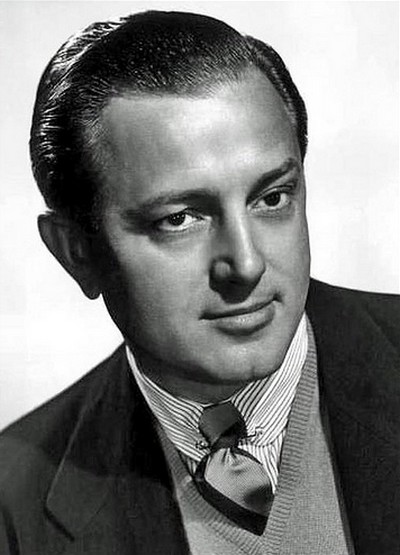
Edward Dmytryk
Director Elia Kazan and screenwriter Budd Schulberg cooperated fully with the committee. Between them they wrecked a number of careers as they coughed up every name they could think of, not just of known Communists, but of those they thought might have been Communists. Kazan would go on to direct On the Waterfront and Schulberg would write the screenplay for it. Both got Oscars. Actor Lee J. Cobb, another witness more than happy to ruin some careers by naming names, also acted in the picture. Kazan would live to be given a special award for lifetime achievement at the Oscars in 1999, 47 years after his testimony destroyed the careers of eight people in 1952. He died in 2003 aged 94.

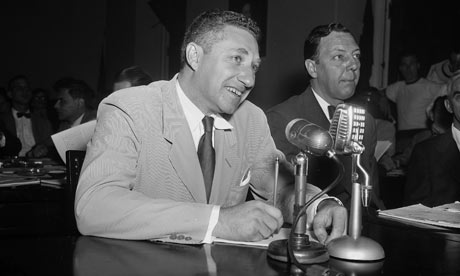
Budd Schulberg testifying
Around 1954 columnists such as Walter Winchell, Hedda Hopper and others regularly suggested names in their newspapers that should be followed up by the HUAC and blacklisted. However, by 1957 cracks were beginning to appear in the HUAC wall. People were becoming fed up with its antics. Blacklisted people were starting to get hired again. Some of them anyway. Kirk Douglas hired Dalton Trumbo, one of the Hollywood Ten’, to write the screenplay for Spartacus. Hailed today for doing so, it must be pointed out that Douglas was well aware he was getting a top writer for ‘peanuts’ because Trumbo was desperate to work again. It took until 2011, nearly sixty years after the event, for Trumbo to be officially recognized as the writer of the screenplay for the 1953 classic Roman Holiday. The man to show the most genuine remorse for his betrayal of his principles and his friends during the hearings was Sterling Hayden. ‘I was a rat, a stoolie’, he admitted, ‘and the names I named of those close friends were blacklisted and deprived of their livelihood’. In fact, he drunk himself into near suicidal depression over his actions. He was one of very few ‘stoolies’ that did.

I absolutely agree with you about Mr. and Mrs. Bogart getting out as soon as they saw who they were really with, and what was really going on.
But I can’t agree about Cary Grant. He grew up in England, you know, and with that upbringing maybe he was more liberal-minded and had no wish to “stand up and be counted” in a period of crazy, but nonetheless deadly, political theatre, especially at the probable cost of his own great career, but rather preferred to sit it out until the Americans were finished pulling their crazy shit (which, in the event, took a very, very long time). And, by the way, just FYI, you don ‘t have to be an intellectual to recognize shit when you see it and smell it.
I did not accuse Grant of anything. I merely mentioned that he did and said nothing which was his prerogative. And he was far from alone in adopting that approach. I am not sure what you meant by your final sentence. I made no comment either way about so-called ‘intellectuals’.
“the Committee for the First Amendment a group formed in September 1947 to support the Hollywood Ten and to oppose those who wished to blacklist actors, writers etc.” The Blacklist was developed by the Hollywood Moguls…not the government. The Hollywood Ten all were in fact card carrying communists, and many others in Hollywood were communist fellow travelers and believers. This was all documented in the well researched & footnoted book, Hollywood Traitors: Blacklisted Screenwriters – Agents of Stalin, Allies of Hitler by Allan Ryskind. As usual, these Ten communists have been classified as innocent victims by the news media and academia for over 60 years which is all lies and propaganda. bogart figured this out too when he said, “Fuckers” after the hearings he attended and the evidence he heard.
I doubt if many media people classified the Hollywood Ten as ‘innocent victims’, Vern. They were Reds sure enough. The issue was that they should not have been forced to confess their politics in a democratic society, nor should they have been gaoled for refusing to answer the question.
Good point about black and white thinking in this case.
Bacall, in her book, talked about she and husband being “duped
Yes, somehow Bogie and Betty did not strike me as the kind of people to take fright. They could get angry or annoyed I’m sure, but I doubt if ANYONE could seriously scare them into doing something they did not want to do.
How can anyone know what “Betty and Bogie” were like without spending time with them. The percreived personas of these actors is pure illusion. Many movigoers think of John Wayne as heroic, when in fact he was so terrified of being forgotten he refused to enlist during WWll, an act of cowardice John Ford never let him forget.
All of the big stars and directors could have worked in Europe rather than dishonor themselves bt turning in people whose only crime was to disagree with an economic system. There are few things lower than a rat.
I agree with you, Ron. But that applies to everyone in history. Historians must research and arrive at conclusions as best they can. I never spent time with Napoleon Bonaparte either, but if I were to write about him I would use the same methodology – read as much as I could about him from as many reliable sources as I could find, then determine which were closest to the truth.
“by turning in people whose only crime was to disagree with an economic system.” I’m afraid you put some heavy makeup on the system they were trying to replace capitalism with. That heavily made-up system you refer to – communism was used by Lenin, Stalin & Mao to starve, murder, & execute over 120 million of their fellow citizens in the USSR & China. It was far more than economics.
Not only that but American boys were dying by the hour by the hands of Communists in Korea, many as a result of the three British spies. People were justified in being paranoid about spies being everywhere.
I recently watched some of that “stuff” on computer, and read about
Bacall and Bogart, who regretted the letter he wrote ’till the day he
died. When asked if his wife shared his sentiments, he said that he
spoke for her as well, that he ‘wears the pants in the family,’ [macho.] She wore pants too.
I’ve had some sympathy for him and others, not those who named names.
Bogart had Warner on his back; had a wife and two children to support. Perhaps there were other options. I’m not well read on subject. Sperber and Lax’s ” Bogart” covers that period, but I’ve
not read it thoroughly.
It is very easy to pigeon-hole people during that era as either for or against McCarthyism, but doing so can be dangerous. We forget that not everyone was an intellectual. Bob Taylor certainly wasn’t. Nor was Gary Cooper. When confronted by the committee they probably did their best to give honest answers, not fully aware of the drastic outcomes of their statements. Personally, I just think Taylor especially was pretty dumb. Bogie and Bacall were fine with being members of the First Amendment group UNTIL they learned that other members (Sterling Hayden in particular) were in fact Communists. It was one thing to stand up for a noble principle, but quite another to do so standing alongside self-confessed Reds and to risk being judged guilty by association. I think I might have bowed out as they did. The ones I least respected were the Cary Grants, the people who washed their hands of the whole thing and carried on with their lucrative careers. After all, there was a vital principle in question here. To bypass it altogether, to let others take the heat, was far more cowardly than anything Bogie or Bacall ultimately chose to do.